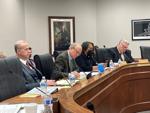JACKSON, Miss. — If you’re black or Hispanic in a conservative state that already limits access to abortion, you’re much more likely than a white woman to have one.
And if the US Supreme Court allows states to further restrict or even ban abortions, minority women will bear the brunt, according to statistics analyzed by The Associated Press.
The numbers are unambiguous. In Mississippi, people of color make up 44% of the population but 80% of women who have abortions, according to the Kaiser Family Foundation, which tracks health statistics.
In Texas, they represent 59% of the population and 74% of those who have abortions. The numbers in Alabama are 35% and 70%. In Louisiana, minorities make up 42% of the population, according to the state health department, and about 72% of those who have abortions.
“Abortion restrictions are racist,” said Cathy Torres, 25-year-old organizing manager at the Frontera Fund, a Texas-based organization that helps women pay for abortions. “They have a direct impact on people of color, black, brown, indigenous… people who are trying to make ends meet.”
Why the big disparities? Laurie Bertram Roberts, executive director of the Alabama-based Yellowhammer Fund, which provides financial support to women seeking abortions, said women of color in states with restrictive abortion laws often have limited access to care. health and a lack of choice for effective birth control. Schools often have ineffective or inadequate sex education.
If abortions are banned, these same women – often poor – are likely to have the hardest time traveling to remote parts of the country to terminate pregnancies or raise children they might find difficult to afford, said said Roberts, who is black and has previously volunteered in Mississippi. only clinical abortion.
“We’re talking about people who are already marginalized,” Roberts said.
Amanda Furdge, who is black, was one such woman. She was an unemployed single student who was already raising a baby in 2014 when she found out she was pregnant with another. She said she didn’t know how she could afford another child.
She had had two abortions in Chicago. Accessing an abortion provider was no problem, Furdge said. But now she was in Mississippi, having moved to escape an abusive relationship. Misled by the publicity, she first went to an emergency pregnancy center which tried to dissuade her from having an abortion. By the time she found the abortion clinic, she was too advanced to undergo the procedure.
“Why can’t you easily and safely access abortion here?” asked Furdge, 34, who is happily raising her now 7-year-old son but continues to advocate for women to have the right to choose.
Torres said that historically, anti-abortion laws have been designed to hurt low-income women. She pointed to the Hyde Amendment, a 1980 law that prevents the use of federal funds to pay for abortions except in rare cases.

She also cited the 2021 Texas law that prohibits abortion after approximately six weeks of pregnancy. Where she lives, near the US-Mexico border in the Rio Grande Valley, women are forced to travel for abortions and must pass state border patrol checkpoints where they must disclose their status as citizen, she said.
Regardless of what lawmakers say, Torres insisted, the intention is to target women of color, to control their bodies: “They know who these restrictions are going to affect. They know it, but they don’t care.”
But Andy Gipson, a former Mississippi legislator who is now the state’s agriculture and commerce commissioner, said race had nothing to do with the Mississippi law’s passage. against abortion after the 15th week. This law is now before the Supreme Court in a direct challenge to Roe v. Wade, the 1973 court decision that legalized abortion nationwide.
Gipson, a white Baptist minister, said he believes all people are created in the image of God and have “innate worth” that begins at conception. Mississippi lawmakers were trying to protect women and babies by placing limits on abortion, he said.
“I absolutely disagree with the concept that it’s racist or anything other than saving babies’ lives,” said Gipson, a Republican. “This is about saving the lives of unborn children and the life and health of the mother, regardless of color.”
To those who say forcing women to have babies will subject them to hardship, Mississippi Attorney General Lynn Fitch, a white Republican, said it’s “easier for working mothers to juggle career success and family life” than 49 years ago when Roe was decided.
Fitch, who is divorced, often talks about her own experience working outside the home while raising three children. But Fitch grew up in a wealthy family and worked in the legal profession — two factors that can give working women the means and flexibility to get help raising children.
This is not the case for many minority women in Mississippi or elsewhere. Advocates say that in many places where abortion services are cut, there is little support for women carrying babies to term.
Mississippi is one of the poorest states, and people in low-wage jobs often don’t get health insurance. Women can enroll in Medicaid during pregnancy, but this coverage disappears shortly after childbirth.
Mississippi has the highest infant mortality rate in the United States, according to the Centers for Disease Control and Prevention. Black infants were about twice as likely as white infants to die in the first year of life in Mississippi, according to March of Dimes.

Across the country, US Census Bureau information analyzed by The Associated Press shows that fewer black and Hispanic women have health insurance, especially in states with strict abortion restrictions. For example, in Texas, Mississippi and Georgia, at least 16% of black women and 36% of Latinas were uninsured in 2019, some of the highest rates in the country.
The problems are compounded in states without effective reproductive education programs. Mississippi law states that sex education in public schools must emphasize abstinence to avoid pregnancy and sexually transmitted diseases. Discussion of abortion is prohibited and instructors cannot demonstrate how to use condoms or other forms of contraception.
Mississippi Director for Planned Parenthood Southeast, Tyler Harden, is a 26-year-old black woman who had an abortion five years ago, an experience that led her to a career supporting pregnant women and upholding the right to health. ‘abortion.
She said that while attending public school in rural Mississippi, she was not taught birth control. Instead, a teacher taped clear tape on students’ arms. The girls were told to put him on the arm of another classmate, and another, and watch how he lost the ability to form a bond.
“They were like, ‘If you’re having sex, this is who you are now: you’re like this piece of duct tape — it’s all worn and washed away and nobody would want that,'” Harden said.
When she got pregnant at 21, she knew she wanted an abortion. His mother was battling cancer, and Harden was in his final semester of college without a job or housing after graduation.
She said she was made to feel fear and shame, just like she did during sex education class. When she went to the clinic, she said protesters told her she was ‘killing God’s most precious gift’ and ‘killing a black baby, playing in what white supremacists want’ .
Harden’s experience is not uncommon. The anti-abortion movement has often portrayed the fight against abortion in racial terms.
Outside the only operating abortion clinic in Mississippi, protesters hand out pamphlets that call abortion black ‘genocide’ and say the late Margaret Sanger, founder of Planned Parenthood and proponent of eugenics, ‘wanted to eradicate minorities “. The pamphlets compare Sanger to Adolf Hitler and proclaim, “Black lives didn’t matter to Margaret Sanger!”
The Mississippi clinic is not affiliated with Planned Parenthood, and Planned Parenthood itself denounces Sanger’s belief in eugenics.
White people aren’t the only ones making this argument. Alveda King, an evangelist who is a niece of the Reverend Martin Luther King Jr., is among black abortion opponents who for years have described abortion as a way to eliminate people of their race.
Tanya Britton, former president of Pro-Life Mississippi, often drives three hours from her upstate home to pray outside the abortion clinic in Jackson. Britton is black, and she said it was a tragedy that the number of black babies aborted since Roe equaled the population of several major cities. She also said people are too laid back to terminate a pregnancy.
“You just can’t take someone’s life because it’s not practical – ‘I want to finish my education,'” Britton said. “You wouldn’t kill your 2-year-old because you were in college.”
But State Rep. Zakiya Summers of Jackson, who is black and a mother, suggested there’s nothing flippant about what poor women are doing. With little support in Mississippi — for example, the legislature rejected a proposal to expand postpartum Medicaid coverage in 2021 — they are sometimes forced to make tough decisions.
“Women are just trying to survive, you know?” she said. “And Mississippi doesn’t make it easy.”
____
Associated Press reporters Noreen Nasir in Jackson, Mississippi, and Jasen Lo in Chicago contributed to this report.

